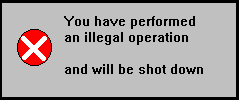

from there
to nowhere

The Dutch always were enormously proud of "their" Royal Airline Company for Holland and Colonies.
So much the better, as they had to make up for the losses from their tax money.
They'd tell you: KLM is so solid, reliable and safe. Reminds me of a certain occasion at Tenerife, where a Pan Am captain, when, through a thick fog, he heard a KLM Boeing 747 pouring on the gas, exclaimed: "The guy's crazy... he's gonna kill us all." "The guy" not did kill them all, true. Read here how they lost their most famous captain, Parmentier, in a Constellation crash at Prestwick in 1948.
KLM's 747-400s had a registration commencing with N (for USA), not PH (for Holland). That's because the Dutch equivalent of the CAB, Rijksluchtvaartdienst does not consider this craft to be airworthy. They must have their reasons.
They'd tell you: their service is so good. Reminds me of that 9 hour trip in the 1970s when they just forgot to offer me a single drink.
And I don't mean alcohol.
And of another time when I wanted, in Amsterdam for cryin' out loud, to change my ticket AMS-CUR to AMS-JFK-CUR. No way, mon. You had to go (I mean, physically - in person) to the travel agency that sold you the ticket, and have it changed there. Tough if that's in Kabul or Pago-Pago. Or Curaçao, where I had to go in the first place. (So I bought another ticket from another company and had my KLM ticket reimbursed once I was back home. Serves 'em right).
IF they, from the goodness of their hearts, decided they would change your ticket for you, they pulled the IATA dollar trick. First, they figured out the rate you had paid in regular US$, while you had paid them in the totally fictitious "IATA dollars", at about 1.5 times the regular currency exchange. Then, they figured out the price for the new ticket in US$ and transferred that to IATA dollars. Which you had to pay, coming out at the bottom of the game at about half what any decent even bank would have given you.
They had a lot of that sort of crap, and when you complained about it, they came back with "those are IATA regulations, sir"; suppressing the obvious fact that they were as responsible for them as other IATA-members. The girls at the counters of Schiphol Airport were actually embarrassed because they had to charge you overweight long after the rest of the world had stopped that practice; also, with KLM you had a baggage allowance of 20 kilos when the usual was twice that weight. [Meanwhile, in 2010, times have changed...] This is not very surprising, especially when you know that (just one example), at KLM headquarters, to get a new pencil you had to hand over the stump of the old one.
For a trip from Amsterdam to Curaçao (where they have over 5 flights a week) we paid more than you would for London to Lima - via Amsterdam-Curaçao. Then, they put you in a nice MD-11 while we had to make do with the B-747, affectionately called de waggelende gans (the wallowing goose) by their crews, who also referred to it as
a mere big DC-8. (These MD-11 flights later went by Bonaire, as the jet fuel there was cheaper than on Curaçao - where it comes from. But that's another story).
So, even though my first flights were in KLM Lockheed Constellations and I carry fond memories of those, I now avoid The Flying Dutchperson like the plague.

cargo con trick
We used to buy Kodak chemicals from an outfit in Switzerland, for some reason. These were shipped by KLM from Zürich via Amsterdam to Curaçao. They came on a shrink-wrapped pallet in cardboard boxes, as packed by Kodak.
As it turned out, ordering from Kodak Nederland N.V. was much cheaper, so we started doing that. However, the freight tariff to Curaçao from Amsterdam was higher than from Zürich. Not only that, but now we were obliged to pack the chemicals in iron-rimmed plywood boxes filled with vermiculite. Not only were those plywood boxes very expensive, they were also pretty heavy, resulting in more cash for freight. This was for "safety purposes". While the excuse was good, it would have been a better one (and less of a rip-off trick) if the same safety measures would have applied to shipments originating in Zürich. But there was more competition there, see?
We now ship by ocean freight; hardly takes longer. Serves 'em right.
Signed
Good News:
the KLM burden is now shared by the Dutch and the French taxpayers
because Holland has outsmarted France by selling KLM to Air France
(which they condescendingly used to refer to as Air Chance)

all material on this site, except where noted
copyright © by , curaçao
reproduction in any form for any purpose is prohibited
without prior consent in writing
(of course, KLM's logo excluded)